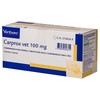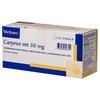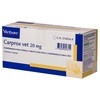Carprox
Carprox Tablets are used to reduce the pain and inflammation caused by degenerative joint disease and musculoskeletal disorders. In addition, because of their anti-inflammatory properties, they can also be used for pain management after surgery.
Carprox Tablets are presented as round, dark brown, marbled tablets with visible darker spots. They are bevel edged and one side has been scored so that they can be divided equally.
Carprox Vet 100mg Tablets for Dogs
£0.65Carprox Vet 100mg Tablets are indicated for the reduction of inflammation and pain caused by musculoskeletal disorders and degenerative joint disease. Carprox Vet can also be used as a...[More info]
Carprox Vet 50mg Tablets for Dogs
£0.41Carprox Vet 50mg Tablets are indicated for the reduction of inflammation and pain caused by musculoskeletal disorders and degenerative joint disease. Carprox Vet can also be used as a...[More info]
Carprox Vet 20mg Tablets for Dogs
£0.23Carprox Vet 20mg Tablets are indicated for the reduction of inflammation and pain caused by musculoskeletal disorders and degenerative joint disease. Carprox Vet can also be used as a...[More info]
Contra-indications
Do not use in cats.
Do not use in pregnant or lactating bitches.
Do not use in dogs less than 4 months of age.
Do not use in case of hypersensitivity to active substance or to any of the excipients.
Do not use in dogs suffering from cardiac, hepatic or renal disease, where there is a possibility of gastrointestinal ulceration or bleeding, or where there is evidence of a blood dyscrasia.
Special warnings for each target species
Refer to Contraindications and Special precautions for use
Special precautions for use
Special precautions for use in animals
Use in aged dogs may involve additional risk. If such a use cannot be avoided, dogs may require careful clinical management.
Avoid use in any dehydrated, hypovolaemic or hypotensive dog, as there is a potential risk of increased renal toxicity.
NSAIDs can cause inhibition of phagocytosis and hence in the treatment of inflammatory conditions associated with bacterial infection, appropriate concurrent antimicrobial therapy should be instigated.
Special precautions to be taken by the person administering the veterinary medicinal product to animals
In the event of accidental ingestion of the tablets, seek medical advice and show the doctor the package leaflet. Wash hands after handling the product.
Adverse reactions
Typical undesirable effects associated with NSAIDs such as vomiting, soft faeces/diarrhoea, faecal occult blood, loss of appetite and lethargy have been reported. These adverse reactions occur generally within the first treatment week and are in most cases transient and disappear following termination of the treatment but in very rare cases may be serious or fatal.
If adverse reactions occur, use of the product should be stopped and the advice of a veterinarian should be sought.
As with other NSAIDs there is a risk of rare renal or idiosyncratic hepatic adverse events.
Use during pregnancy, lactation or lay
Studies in laboratory species (rat and rabbit) have shown evidence of fetotoxic effects of carprofen at doses close to the therapeutic dose. The safety of the veterinary medicinal product has not been established during pregnancy and lactation.
Do not use in pregnant or lactating bitches.
Interactions
Do not administer other NSAIDs and glucocorticoids concurrently or within 24 hours of administration of the product. Carprofen is highly bound to plasma proteins and may compete with other highly bound drugs, which can lead to toxic effects.
Concurrent administration of potential nephrotoxic drugs should be avoided
Amounts to be administered and administration route
For oral administration.
An initial dose of 2 to 4 mg carprofen per kg bodyweight per day is recommended to be given as a single or in two equally divided doses. Subject to clinical response, the dose may be reduced after 7 days to 2 mg carprofen/kg bodyweight/day given as a single dose.
To extend analgesic cover post-operatively, parenteral therapy with solution for injection may be followed with tablets at 4 mg/kg/day for up to 5 days.
Duration of treatment will be dependent upon the response seen, but the dog's condition should be re-appraised by the veterinary surgeon after 14 days therapy.
Overdose
Do not exceed the stated dose.
There is no specific antidote for carprofen overdosage but general supportive therapy, as applied to clinical overdosage with NSAIDs should be applied.
Withdrawal periods
Not Applicable


